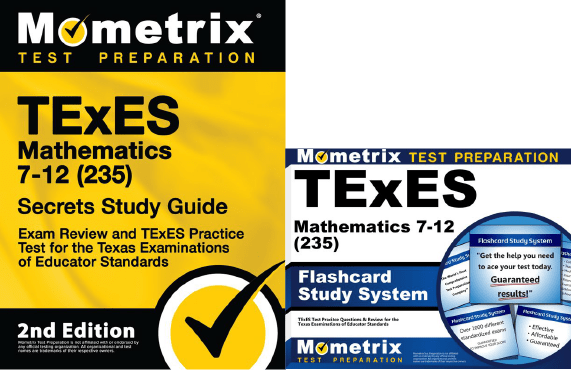If you need help studying for the TExES Mathematics 7-12 exam or just want some more information about what the exam is like, you’ve come to the right place.
Click below to take a free TExES Mathematics 7-12 practice test!
What’s on the Exam?
There are 100 multiple-choice questions on the exam, and the time limit is 4 hours and 45 minutes. There aren’t any scheduled breaks, but you’re free to take restroom breaks as needed.
Let’s take a closer look at the different sections of the exam.
1. Number Concepts
14% of the exam
- The real numbers system
- The complex number system
- Number theory concepts and principles
2. Patterns and Algebra
33% of the exam
- Using patterns to solve problems and formulate conjectures
- Attributes of functions, relations, and their graphs
- Linear and quadratic functions
- Polynomial, radical, rational, piecewise, and absolute value functions
- Exponential and logarithmic functions
- Trigonometric and circular functions
- Differential and integral calculus
3. Geometry and Measurement
19% of the exam
- Measurement as a process
- Understanding geometries as axiomatic systems
- Euclidean geometry
- Coordinate, transformational, and vector geometry
4. Probability and Statistics
14% of the exam
- Using appropriate graphical and numerical techniques to explore data
- Concepts and applications of probability
- Probability theory, sampling, and statistical inference
5. Mathematical Processes and Perspectives
10% of the exam
- Mathematical reasoning and problem-solving
- Mathematical connections within and beyond mathematics
- Communicating mathematical ideas and concepts
6. Mathematical Learning, Instruction, and Assessment
10% of the exam
- Understanding how children learn mathematics
- Planning and implementing instruction
- Formal and informal assessment techniques
Computer-Adaptive Testing (CAT)
The TExES Mathematics 7-12 exam is a computer-adaptive test. Basically, this means that the questions will become harder or easier as you go through the exam, based on how well you’re answering the questions.
For example, say you answered the first question correctly. The first question is of medium difficulty, so the next question will be slightly harder. Then, let’s say you answered the second question incorrectly. The next question would then be a medium question.
How to Register
To get started with your registration, you’ll need to create an account on the NES website. You can then register for the exam and schedule a test date through your account.
When you submit your registration, you’ll need to pay the $116 testing fee.
Exam Scores
The test is scored using a scaled scoring method. Here’s how it works:
You will need a score of 240 to pass the test.
The reason your raw score is converted to a scaled score is because everyone who takes the test is given a slightly different set of questions. Since everyone has a different arrangement of questions, and because some questions are harder than others, converting your raw score to a scaled score ensures a more even playing field.
FAQs
How many questions are on the TExES Mathematics 7-12 exam?
The exam contains 100 questions.
What is the time limit for the TExES Mathematics 7-12 exam?
The exam is timed at 4 hours and 45 minutes.
What is the passing score for the TExES Mathematics 7-12 exam?
You’ll need to get a final scaled score of at least 240 to pass.
How much does the TExES Mathematics 7-12 exam cost?
The testing fee is $116.



 TExES Study Guide
TExES Study Guide TExES Flashcards
TExES Flashcards
